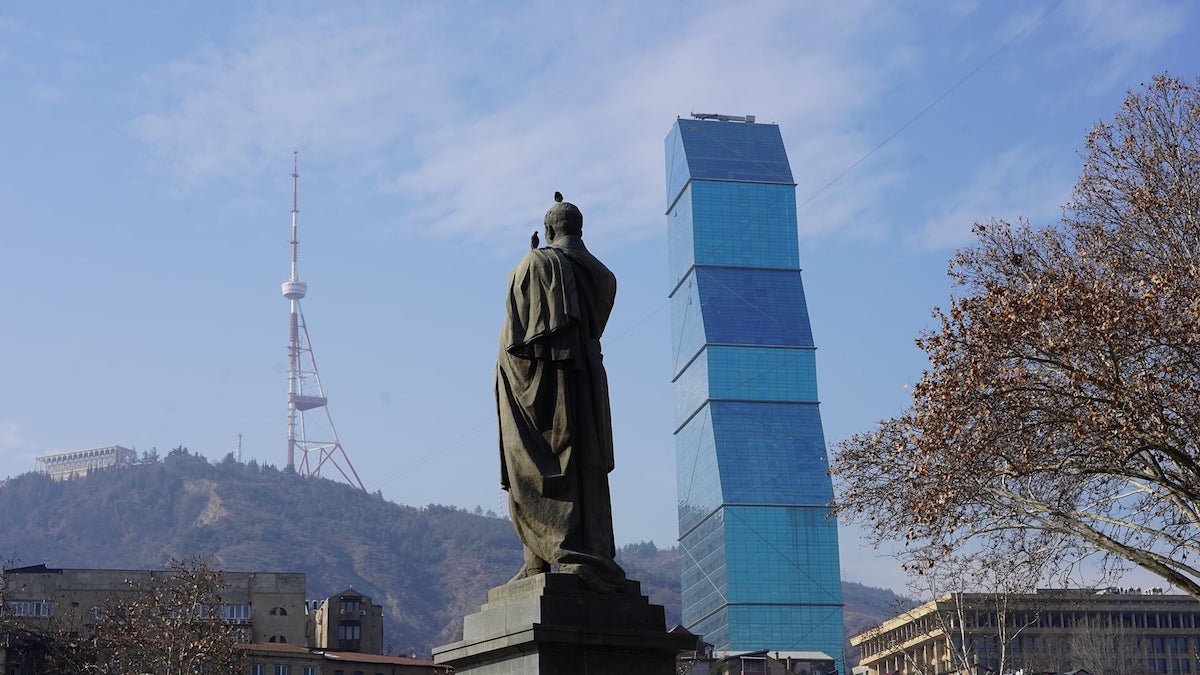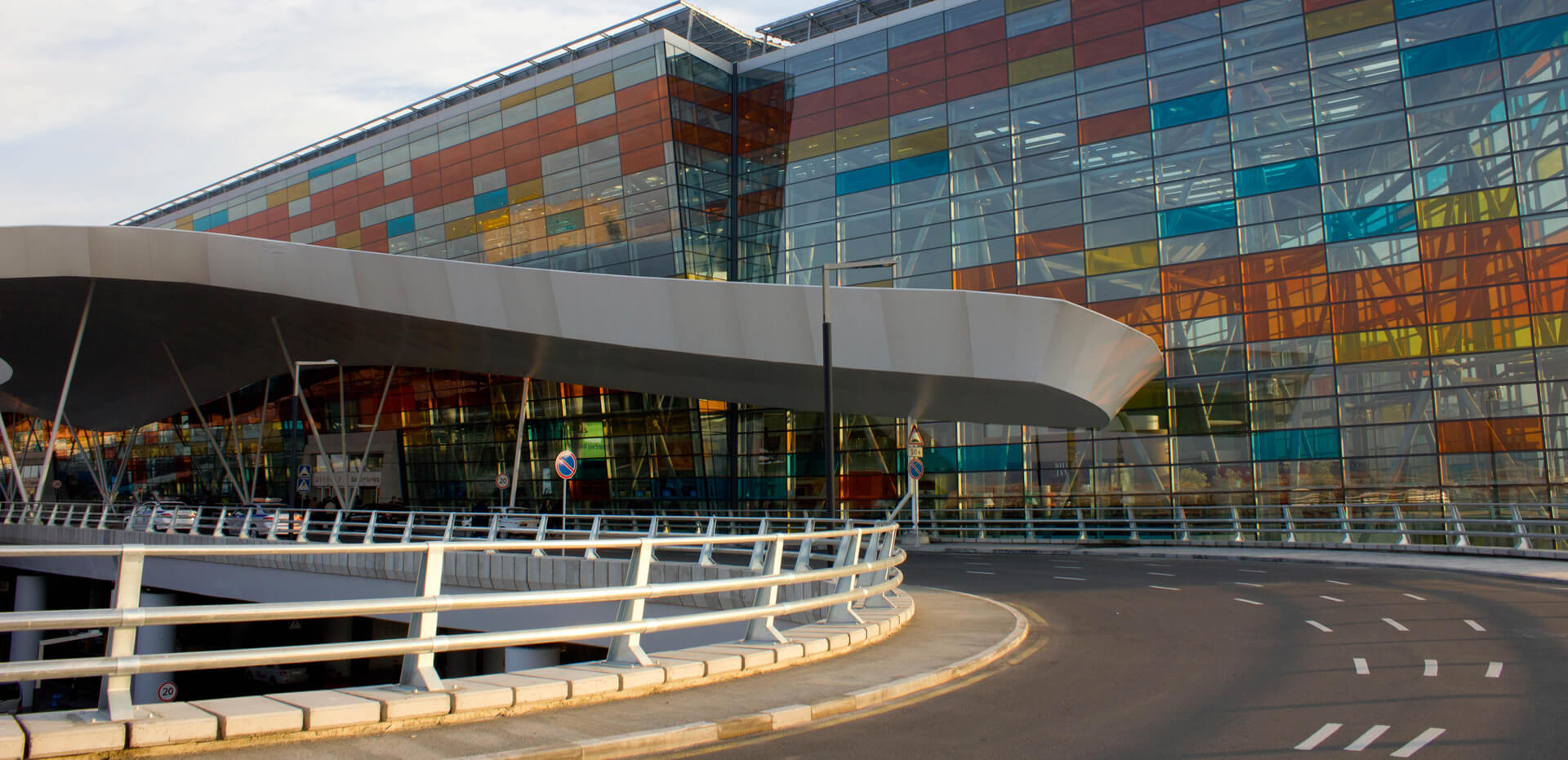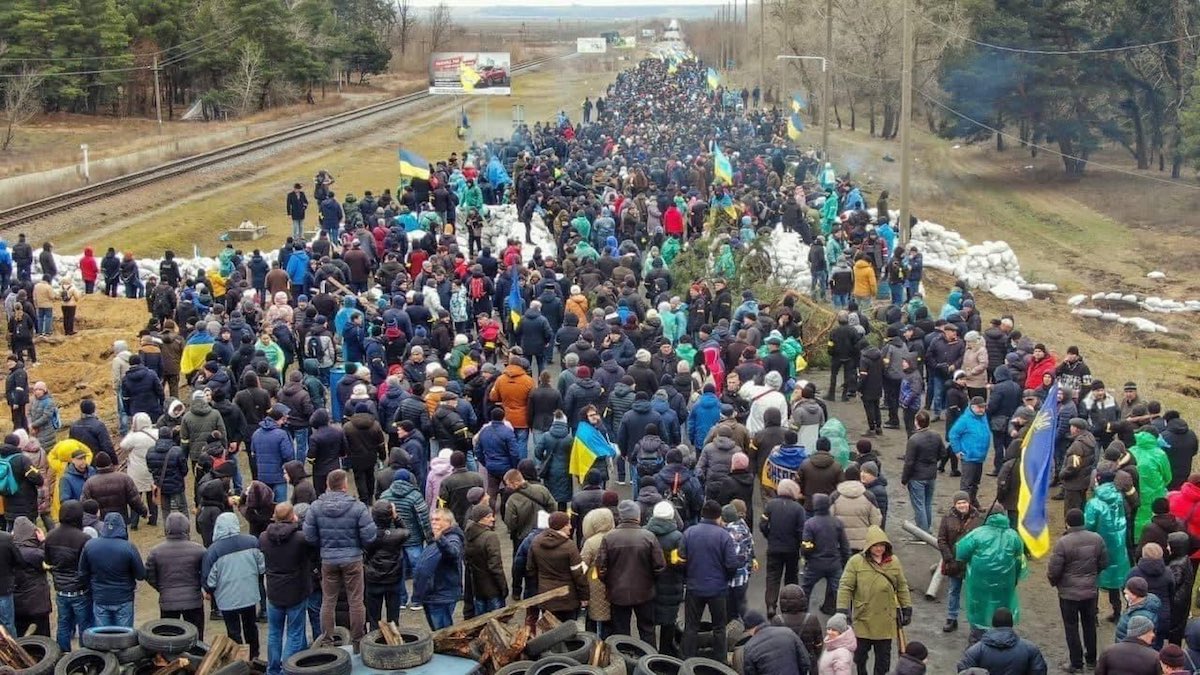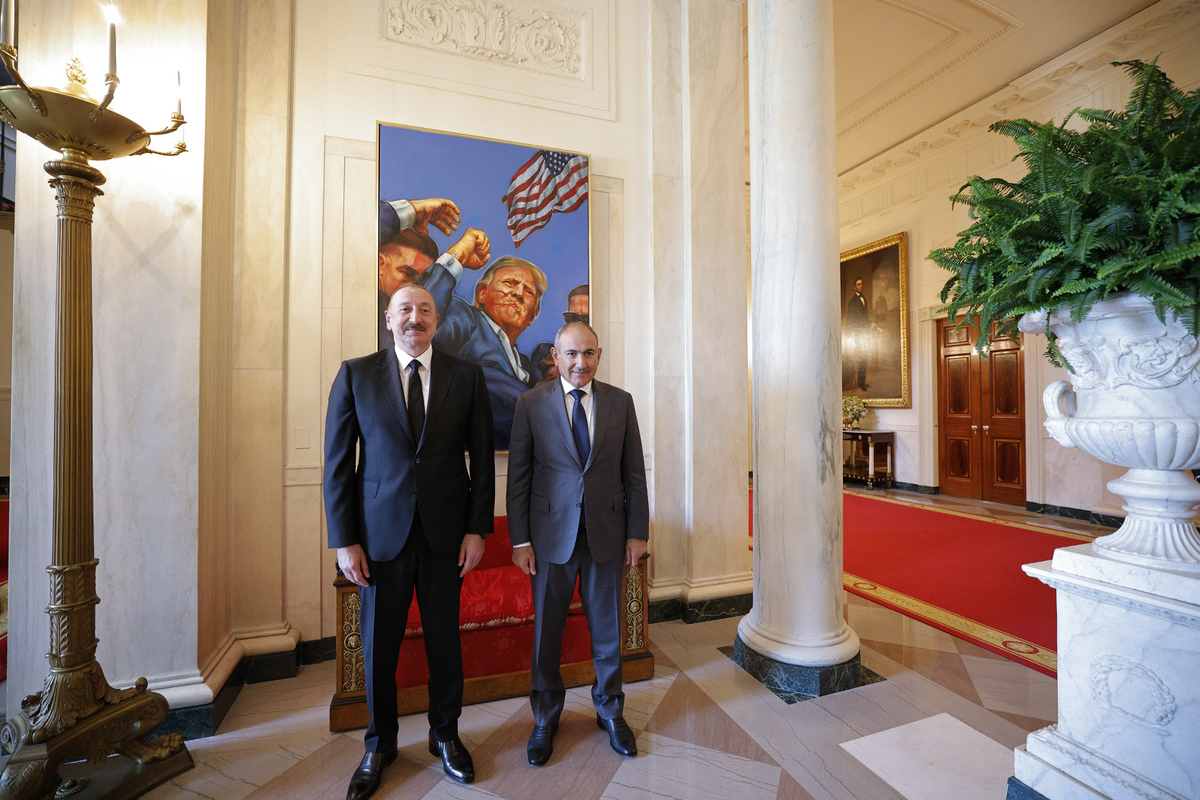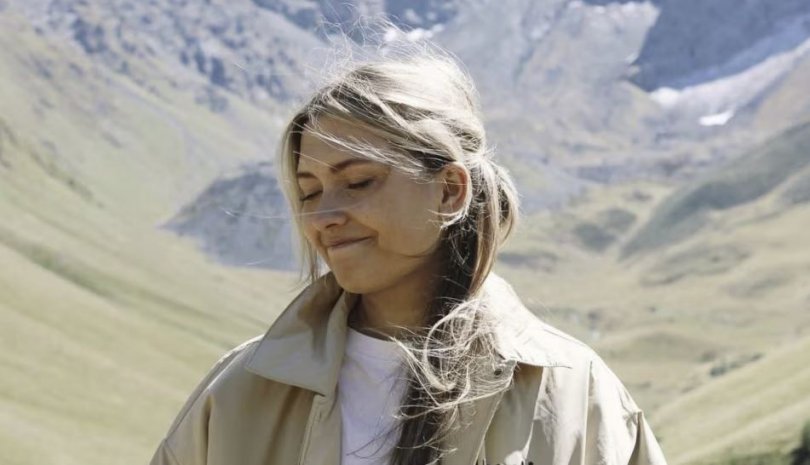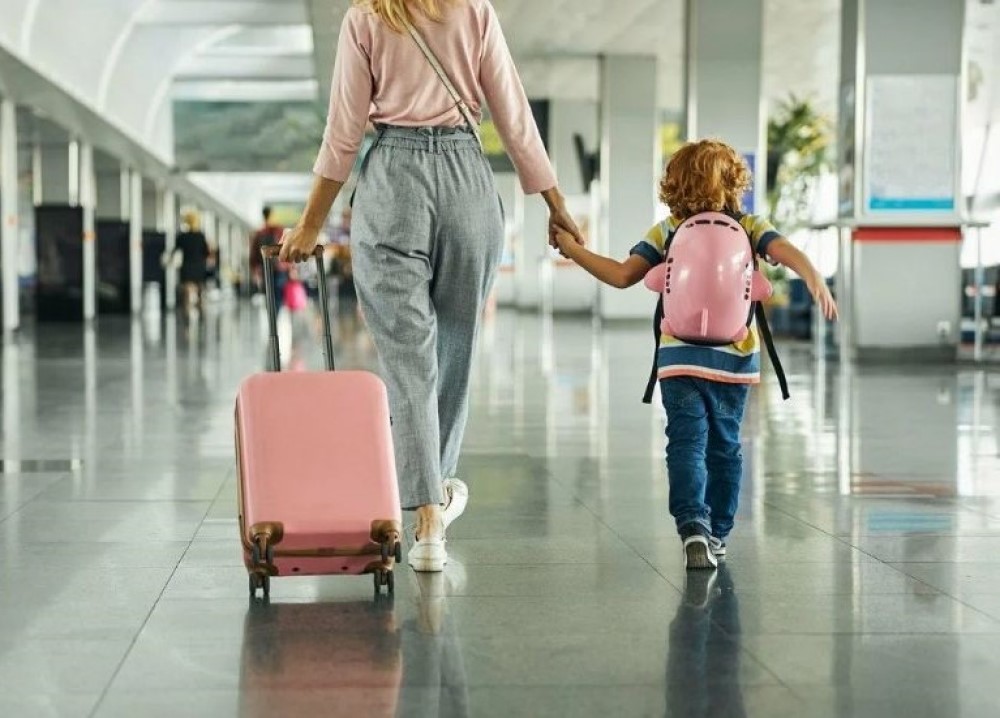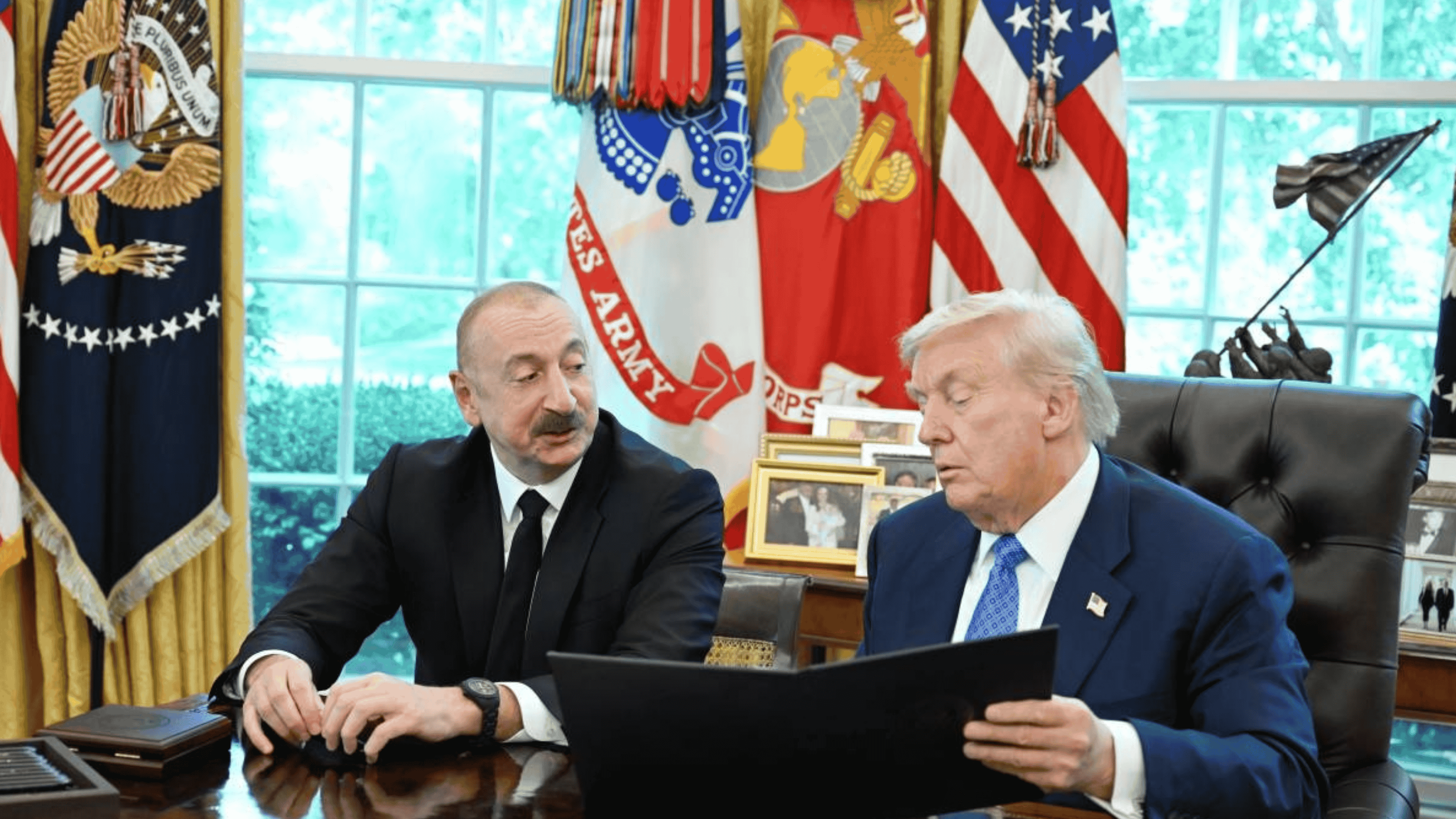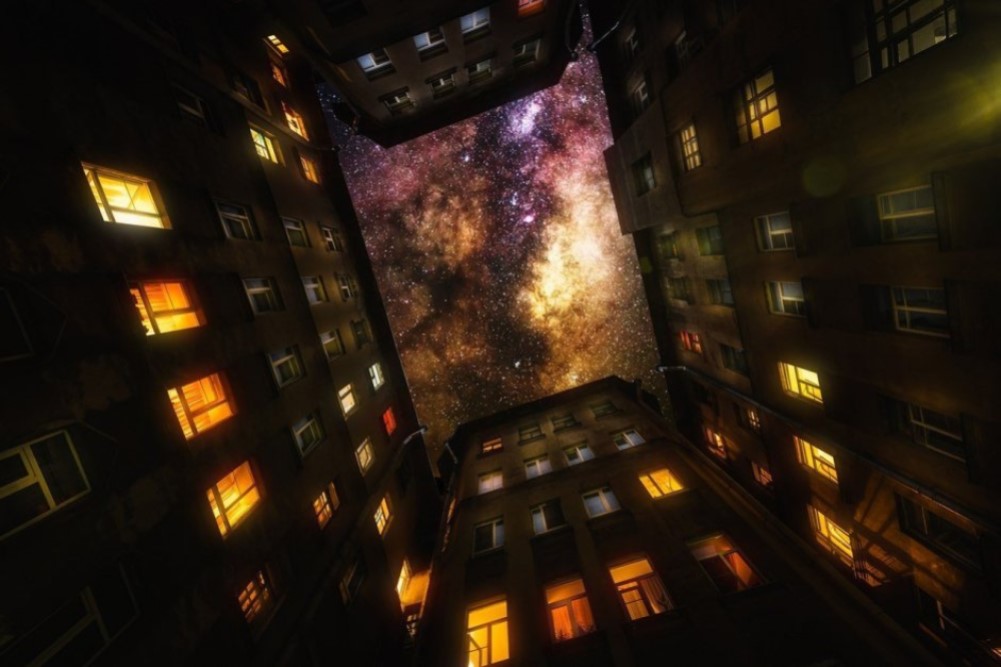'Not enemies' - how Georgia welcomes emigrants from Russia and Belarus
Russian and Belarusian emigrants in Georgia
After the start of the war in Ukraine, Georgia became one of the main destinations for citizens of Russia and Belarus who decided to leave their countries. Before the outbreak of hostilities, Georgia was considered an attractive destination for people who disagreed with the authorities and wanted to emigrate from these countries. JAMnews shares the stories of new political emigrants – their reasons for going to Georgia, the problems they face and how they are met here.
According to the Georgian authorities, from February 24 to March 20, 35,000 Russian citizens arrived in Georgia. And from February 24 to March 16 – more than 15,000 citizens of Belarus.
“They say that such a large number of arrivals is dangerous, but this is not true”, said Georgian Economy Minister Levan Davitashvili. According to him, before the pandemic, more tourists came to Georgia from these countries over the same period of time.
Such a large number of Russian and Belarusian citizens entering Georgia has become the subject of fierce discussions in Georgian society. People perceive these people differently, everyone has their own arguments – the discussion of the topic on social media is still fierce and ongoing.
There are those for whom it is unacceptable to receive citizens of the “occupier country and its satellite country” in Georgia. They fear that Russia will put pressure on Georgia in the future for the sake of “protecting Russian citizens”.
“They are escaping discomfort and sanctions, not Putin’s regime. Was Putin different before?” – this is one of their typical arguments.
Others, on the contrary, call on the public to show solidarity with people seeking asylum.
In principle, the citizens of Russia today do not have much choice in where to go. Europe and the USA are closed to them if they don’t have a visa. Georgia, Armenia, Turkey, Israel, as well as the countries of Central Asia are the destinations where most people “fly” from Russia.
Citizens of Russia and Belarus do not need a visa to enter Georgia. They can live there without leaving for a year.
Georgia is also attractive because the cost of living is relatively low and the local climate is pleasant.
- Ukrainian girl who came to Georgia for a few days and stayed forever. Blog
- Georgia’s minorities: breaking down barriers to integration
Citizens of Russia and Belarus told JAMnews why they decided to come to Georgia.
One of the arguments in favor of choosing Georgia is the hospitality of local people.
However, this time those who come to Georgia see a different picture. Along with the flags of Ukraine fluttering all over the city, on the streets of Tbilisi, one can often see the inscriptions: “Russians – go home”, “Russian ship – go to hell”, etc.
“Now my home is Georgia”
Vasily Krestyaninov, 24, left Russia a few months before the war. He has been living in Tbilisi for four months now.
Vasily is from Moscow, he was born and raised there. Today he does not know when he will return to his country and whether he will return at all.
It all started a year ago, on Vladimir Putin’s birthday. On that day, 23-year-old physical education teacher Vasily Krestyaninov participated in an anti-government rally in the center of Moscow.
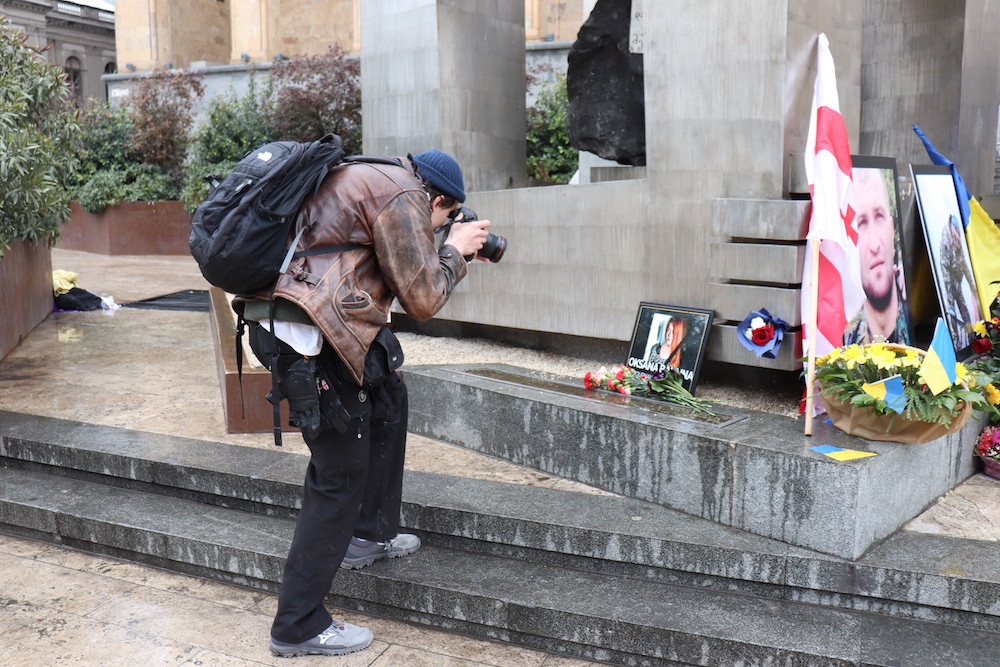
Krestyaninov was detained, fined $200 for participating in an unsanctioned rally, and released, but from that moment on, his life turned into hell.
He was called to the police station along with his father, who has been working as the director for 30 years in the same school where Vasily taught physical education.
The police called Vasily a disgrace to the country and a traitor and told him that they knew everything about him – with whom he is friends, what he posts on social networks, and so on.
“In Russia, you should not be called to the police. If you are called, it means that things are really bad. It doesn’t matter the reason – even if it’s a small matter if you get called to the police, this is it for you”.
Vasily quit his job so that his father would not lose his position, and took up photojournalism.
“I have filmed for various international media. I didn’t come out to protests, but I tried to fight this system by covering the rallies and spreading information”.
During the year, Vasily filmed all the rallies that took place in Moscow.
“In Russia, a banner can be unfolded for only 30 seconds, so you need to take a good photo in those 30 seconds. Even if you are holding a blank banner, the ambush cop will come up within 30 seconds at the most and drag you into the car. What will happen next, no one knows.
If you only go to a rally once, you will be followed everywhere. If you write a comment on social media that, for example, you do not like Putin, the next day a policeman will come to your house. If you write words like ‘Putin is a thief’, the door of your house will be broken”, says Vasily.
Later, his brother was called to the police and ordered to follow Vasily.
“I already wanted to leave then, because my whole family was in danger, but I stayed anyway. I still hoped that we could make a difference”.
In November 2021, he was contacted by the police. This time he was offered cooperation.

Vasily sat in the department and watched himself on video recordings: how he walks along the street, how he takes pictures at rallies. The police said that if he did not cooperate, they would find drugs on him and put him in jail.
Vasily refused to cooperate. This meant that he could not stay in the territory of the Russian Federation for a single day more. As soon as he left the police building, he bought a ticket and flew to Tbilisi.
“I won’t be able to return to Russia until the end of the Putin regime”, he says.
Now Vasily is a freelance photographer collaborating with various media. He rents an apartment in the city center with his girlfriend, who, along with her family, also fled the Russian regime.
Vasily and Liza love to walk in nature, in the mountains – every week they go out of town and visit places that are not popular with tourists.
“I went to shoot in Kazakhstan and when I returned, I had the feeling that I was going home. Now my home is Georgia. However, I will never forget that I am a guest here. Nobody should forget that we are guests in Georgia. Often the citizens of my country forget about it, and problems with the Georgian people can arise only in this case”.
“We have become enemies of the whole world”
36-year-old Alexander and 26-year-old Yuri arrived after the start of the war. Alexander represented the opposition party in local government in his native Krasnodar, and Yuri worked as a lawyer in the organization of the opposition leader Alexei Navalny in Syberia.
“I arrived on March 6th. I didn’t think that I would ever leave my country and stop fighting”, Alexander tells us. “But it was impossible to stay in Russia. I was threatened with a prison for 15-20 years just because I said out loud that war could not be allowed. Our country is on the path of North Korea”.
Alexander first flew to Yerevan, and then came to Georgia.
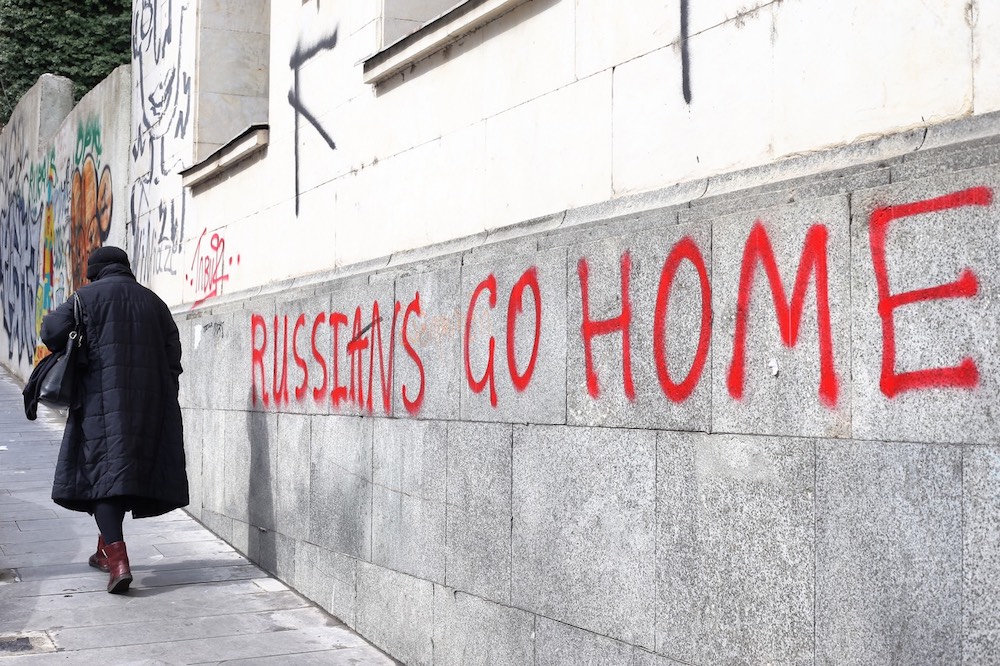
Yuri first tried to stay in Kazakhstan, then in Istanbul, and finally, he also came to Georgia.
According to him, Georgia is a safe country that does not require a visa. In addition, most people speak Russian or English, so communication is not a problem. The climate is good, people are warm and hospitable.
According to the Russians, they did not feel discrimination or aggression, because they always say that they are against the Putin regime and are in solidarity with Ukraine.
We ask them about the anti-Russian graffiti on the walls in Tbilisi.
“I understand why they don’t want us here. Now the citizens of Russia are in the same position that Germany during the Second World War, and we must endure this. Moreover, Georgia remembers the war of 2008, and we must also remember this”, says Yuri.
He says that he personally did not feel the aggression in Tbilisi.
“On the contrary, people are just trying to help. In the evenings, I sit with one elderly woman near the church, drink wine and talk. I feel like everyone here understands me. I don’t know how much someone likes me here, but I really like it here”.
“I don’t take the slogan “Russians, get out” personally because I think that I am in the same struggle as Georgia”, Alexander says. “Georgia has experienced the same thing that is happening in Ukraine now. So, on the contrary, I understand this attitude and I am simply grateful to this country for giving me shelter. It is a very good country with extraordinary people, but I want to return to my country as soon as possible – but only if it is possible to live there.
“The Russians have become unbearable for the whole world”, says 24-year-old Vasily. “Russia has no friends, except for one or two, and not even the real ones. We have become enemies of the whole world – deservedly so. I am not ashamed of my nationality, but I am ashamed that we could not defeat this regime, and personally, I feel guilty”.
“I burned my passport”
Vasily, Alexander, and Yuri get together at the Free Russia Foundation office. Vasily processes photos of protests and rallies and sends them to various media, while Alexander and Yury try to help citizens who are being persecuted just like them.
This foundation is an international organization that seeks to develop democracy in Russia and help people who have become victims of the regime. They have offices in Washington DC, Berlin, Kyiv, and Tbilisi. In Russia, there is no.
On the walls of the Tbilisi office, photographs of dozens of Russian citizens are hanging in alphabetical order — these are people who are serving long prison terms for protesting or making opposition comments on social media. According to today’s data, there are at least a thousand people.
“I was one of the first people to burn a Russian passport during a protest in Tbilisi”, says Anton Mikhalchuk, 31, a spokesman for the organization.
“The Russian government has brought me nothing but trouble, and, unfortunately, not only to me but also to many other peoples. This is a military dictatorship, and I do not want to be associated with the Russian government, so I will never hold the Russian flag in my hands”.
Anton has been living in Georgia for three years now. He, like others, fled from the regime and is now trying to help and protect other citizens of Russia and Belarus, the fund is also trying to help refugees from Ukraine arriving in Georgia.
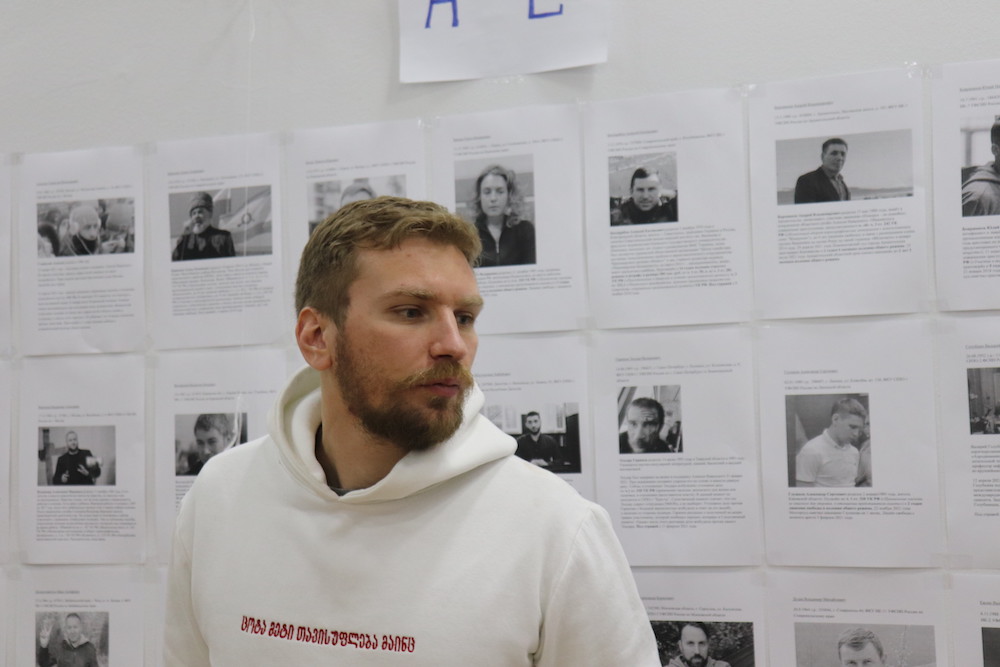
“Georgians should not be afraid of us. To settle here, you need to know Georgian well, and most Russians do not know Georgian. Georgia is now a kind of bridge. People can come here quickly and thus escape the regime. But if the situation improves, these people will leave”, says Mikhalchuk.
“There is no place for art in war”
29-year-old Ignat Kachan arrived from Belarus with his wife in mid-March. Ignat is a director who makes documentaries and feature films. His films were shown at the Batumi International Film Festival, since then he has always liked Georgia.
Until recently, he was living in a village far from Minsk, where he planted more than 100 trees on one hectare with his own hands and waited for them to start flowering. He was not going to leave anywhere – he lived in complete harmony with himself, and `he had many plans.
However, as soon as the war began, he realized that he could not stay in Belarus.
“In war, there is no time for art. You have to be away from war to talk about art. We are now enemies to those with whom we used to be friends. Because of bad leaders, people lose each other”.
Moving to Georgia was his wife’s idea, and Ignat immediately agreed.
“Our countries have a common past and history, so this is a natural environment for me. Nature is extraordinary here, people are warm and open. If you behave politely, say hello in Georgian, and show them respect, they will not treat you badly”.
Ignat Kachan plans to stay in Georgia for two years and make a documentary. Where he does not know where he will go next.
“Living in Georgia is a great experience. I learn a lot from Georgians – first of all, relationships with people. I really want to do at least one project here. I will choose a person whose thoughts and feelings I will follow and then show in the film.
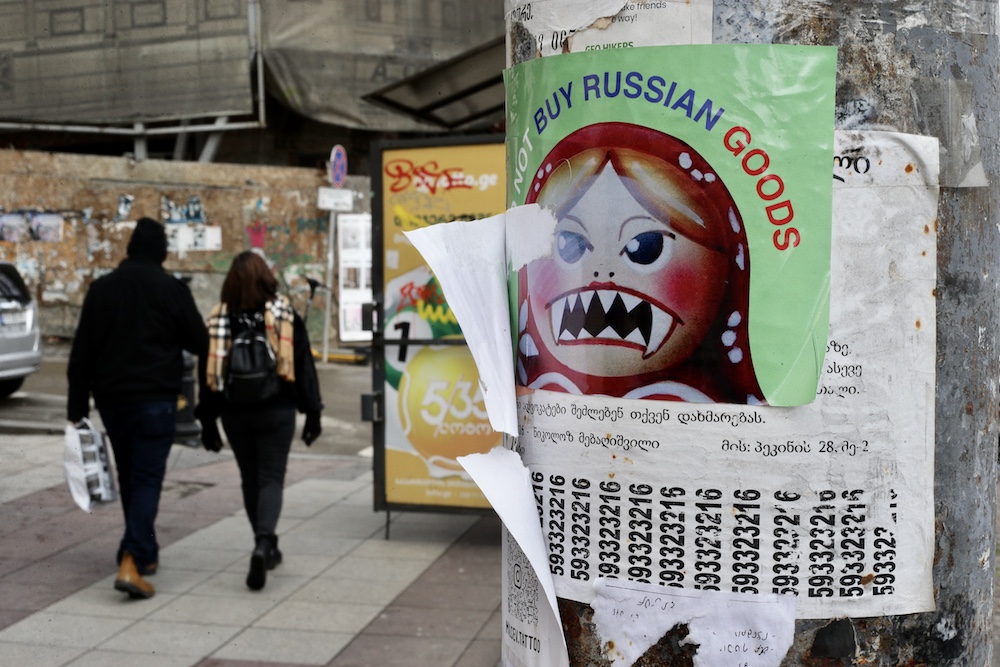
Welcome or unwelcome guests?
The discussion about how to welcome Russian citizens and whether they should be allowed into Georgia has been going on since the first day of the war.
Cases of aggression and violence against people of Slavic appearance or Russian speakers are often shared on Facebook.
There were fears that citizens of Russia and Belarus could become victims of discrimination.
“The state did not take any measures to control the background of those who enter the country and their reasons for coming, so people are left with only moral factors. Now each of us must decide for ourselves how to act”, says Vato Asatashvili, a tourism expert.
“There is no reason to panic because of the influx of Russians and Belarusians. Much more people moved to Armenia than here. On February 24 and 25, 25 flights a day flew to Yerevan, during the first two weeks up to 80,000 border crossings were recorded. At the same time, the peak of arrival in Georgia was in early March and will now gradually decrease. There will be no such inflow in April,” he says.
According to him, the expectations that real estate prices would double, and that Georgia would receive large economic benefits over this period, were excessive.
“First, it is immoral to think of profiting from asylum seekers, whether they are from a friendly country or a hostile one. Secondly, it was a false expectation – the number of tenants was not very large, and it was just an illusion that a large amount of Russian capital was moving to Georgia and now real estate would be rented out at double and triple the price.
However, there were indeed such cases. A Belarusian journalist interviewed by JAMnews, who fled the Lukashenka regime in the summer of 2021, rented an apartment in Batumi for $300. In early March, the landlord asked him to move out or pay $200 more.
“$500 is a very large amount, and we could not pay that much. Moreover, the apartment was not worth it. As a result, we found another apartment and moved there. It hurts to realize that even in Georgia they don’t understand what it means to be an exile of the Lukashenka regime, and that’s how they treat you”.
According to Vato Asatashvili, many citizens of Georgia themselves rented an apartment in order to re-let it to the citizens of Russia and Belarus at a double price.
“The provoked demand led to a rapid increase in prices. However, the market will adjust this within two to three weeks. Prices will fall and return to the standard rate. In total, the number of people arriving from both countries on long-term visits will not exceed 20,000 people, which is not so much”.
However, the problem lies in the registration of these people. Today, both a Ukrainian refugee entering Georgia, an asylum seeker, a citizen of Russia or Belarus, and a person who simply arrived on a business trip from any country, are all equally registered at the border as tourists.
According to experts, the state should first develop a system that would distinguish refugees and asylum seekers from tourists.
“Humanitarian law requires us to help those in need. It is not only the law that calls us to provide asylum, but also our civilizational values, religious or simply human morality. But we shouldn’t do it blindly. Who you help and who you don’t should be clear, transparent, and understandable to everyone. The government does not do this, and that is why we have so many questions”, says Paata Zakareishvili, a political scientist and former Georgian State Minister for Reconciliation and Civic Equality.
“When a person crosses your border, you have every right to ask questions about the purpose of the visit and request information about their biography. The state should have taken care of and developed a system for registering asylum seekers. Then they would be checked – what they do, how they spend money, how long they stay, etc”, he says.
“On the one hand, we must know who is in trouble, so as not to develop our economy at their expense, but, on the contrary, to help them. On the other hand, we must not allow ourselves to profit from Russian money. From the very beginning, the state had to prepare and introduce regulations, according to which we would choose who we let into the country in such a tense situation, and who not”, Vato Asatashvili believes.
After the wave of migration of Russian and Belarusian citizens to Georgia began, many citizens of Georgia demanded the introduction of a visa regime – precisely in order to avoid unpleasant incidents.
It is also still unclear why any citizen of Russia and Belarus crosses the border of Georgia without any problems when representatives of Russian and Ukrainian opposition media were not allowed to cross the border.
“You can introduce the visa regime in an ideal calm environment. When people run away, it’s hard. In times of war, there is mass displacement and people flee to the easiest frontier. Therefore, we had to introduce regulations and make the process transparent. Now everything is very uncertain”, says Paata Zakareishvili.
“Our door is open to any citizen of Russia and Belarus at a time when the state has not appointed a single special flight to deliver Ukrainian refugees to Georgia”, says Vato Asatashvili.
According to experts, today’s reality is a test for Georgian society. Since the Georgian government has not introduced rules and left the country open to everyone, people must decide for themselves who to help and who not, at whose expense to run their business, and who to refuse services.
“We should not perceive these people as tourists and should not profit from them. These are not wealthy people who came on vacation. Now, mostly young people who do not have EU visas come to Georgia, or those who could come by car, who do not have big savings, and who were forced to make a quick decision. People with high incomes go to Europe, not to Georgia”, says Vato Asatashvili.
“However, along with those in need of asylum, there are many “patriots of Russia” who fled from discomfort, says Paata Zakareishvili. “Such people may well cause irritation, but in no case should they be discriminated against and treated aggressively. We can set conditions for them in a hotel or restaurant: do not let them play the Russian anthem or do not allow them to fly the Russian flag. We must remember that we have the right to do so”.
With the support of “Mediaset”










